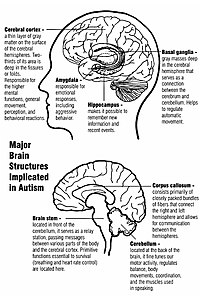
Photo from wikipedia
The American Academy of Pediatrics recommends that children be screened for autism at 18 and 24 months. It is unknown whether a positive screen usually represents the first developmental concern or… Click to show full abstract
The American Academy of Pediatrics recommends that children be screened for autism at 18 and 24 months. It is unknown whether a positive screen usually represents the first developmental concern or is typically preceded by other developmental and/or medical concerns. This study evaluated the proportions of toddlers (M = 18.69 months) who screened positive for autism for whom caregivers or providers had prior concerns, the nature and timing of prior concerns, and their relationship with family characteristics. The electronic health records of 242 children who screened positive using the Modified Checklist for Autism in Toddlers–Revised with Follow-up during routine well-child visits were reviewed. Among toddlers who screened positive for autism, the majority (79.34%) had a documented prior motor, language, and/or autism concern. The presence of specific concerns was associated with earlier timing and higher Modified Checklist for Autism in Toddlers–Revised with Follow-up scores. Prior medical concerns were common, such as sleep (23.14%) and gastrointestinal (66.12%) problems. A positive autism screen often occurs in the context of pre-existing concerns. Thus, screening can provide providers with an opportunity to contextualize feedback about autism in the context of prior developmental and medical concerns. The American Academy of Pediatrics recommends that all children be screened for autism at their 18- and 24-month well-child visit. For children who screen positive for autism, it is unknown whether this usually represents the first time a developmental concern has been raised or if other developmental concerns typically precede a positive autism screen. Such knowledge could help guide providers in how to appropriately convey feedback regarding autism screening. This study found that, for close to 80% of children with a positive autism screen, caregivers or providers had a prior autism, language, motor, or other developmental concern documented in the electronic health record. Many also had other prior concerns frequently linked to autism, such as sleep and gastrointestinal problems, and received physical or speech therapy. On average, prior to screening children who received a positive Modified-Checklist for Autism in Toddlers had two documented concerns by at 1 year of age and three concerns by 2 years of age. These findings imply that screening for autism as a part of routine pediatric care likely takes place in the context of larger conversations regarding existing developmental concerns, allowing for a less stigmatizing discussion of autism. Framing the presence of prior concerns in the setting of a positive screen in this context may create a reaffirming space for existing caregiver concerns and a lessened emotional burden on caregivers.
Journal Title: Autism
Year Published: 2023
Link to full text (if available)
Share on Social Media: Sign Up to like & get
recommendations!